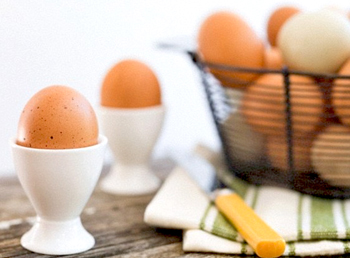HIGH-fat cheese and yoghurt as well as eggs can help reduce the risk of type-2 diabetes, according to new research.
A diet including dairy products high in fat can cut the chances of developing the disease by nearly a quarter, scientists in Sweden and Finland have found.
 Those who consume at least four eggs a week also stand to dramatically reduce the diabetes risk by 37 per cent compared to those who eat one egg over the same period.
Those who consume at least four eggs a week also stand to dramatically reduce the diabetes risk by 37 per cent compared to those who eat one egg over the same period.
The research goes against the long-held notion that fatty dairy goods should be viewed as unhealthy of because of their effect on cholesterol levels.
Diabetes affects one in 25 people – approximately 228,000 – in Scotland, with type-2 accounting for around 87 per cent of all cases. It is estimated up to 20,000 Scots remain undiagnosed.
In the first study by Lund University in Sweden, scientists looked at the significance of fat in food rather than the amount eaten and examined the different sources of saturated fat. Both meat and dairy products contain saturated fat, but certain saturated fatty acids are particularly common in dairy products.
This difference could be one of the reasons why most studies show that those who eat meat are at higher risk of type-2 diabetes, whereas those who eat a lot of dairy products appear to have a lower risk.
The study, published in the American Journal of Clinical Nutrition, looked at the eating habits of 27,000 individuals aged 45 to 74 in a Malmö diet and cancer study from the early 1990s.
Two decades on, over a tenth – 2,860 people – had developed type-2 diabetes and results indicated high-fat dairy products are specifically associated with reduced risk.
The report’s author, Dr Ulrika Ericson, said: “Our results suggest that we should not focus solely on fat, but rather consider what foods we eat. Many foodstuffs contain different components that are harmful or beneficial to health, and it is the overall balance that is important.”
Another study by the University of Eastern Finland looked at eggs and their role in type-2 diabetes.
Some studies found high-cholesterol diets were associated with disturbances in glucose metabolism and increased risk of the disease while others found eggs led to improved glucose balance. But there had been no population-based studies and what research had been done suggested there was an elevated risk or no association at all.
The new study looked at the eating habits of 2,332 men aged 42 to 60 who took part in a heart disease risk factor study between 1984 to 1989. Two decades later, 432 men were diagnosed with type-2 diabetes.
The results showed eggs not only reduced the risk of type-2 diabetes but also lowered blood- glucose levels. Men who ate approximately four eggs per week had a 37 per cent lower risk of type-2 diabetes than men who only ate approximately one egg per week.





Comments
Add new comment